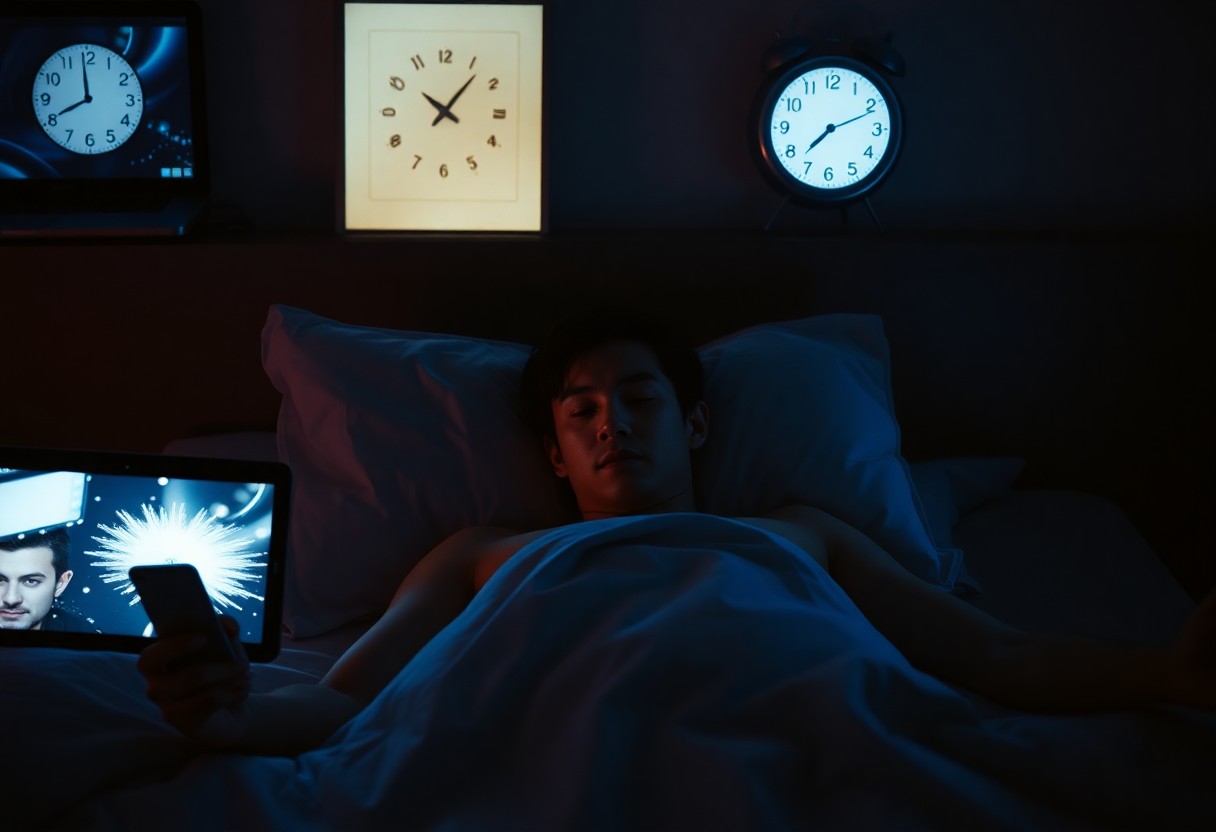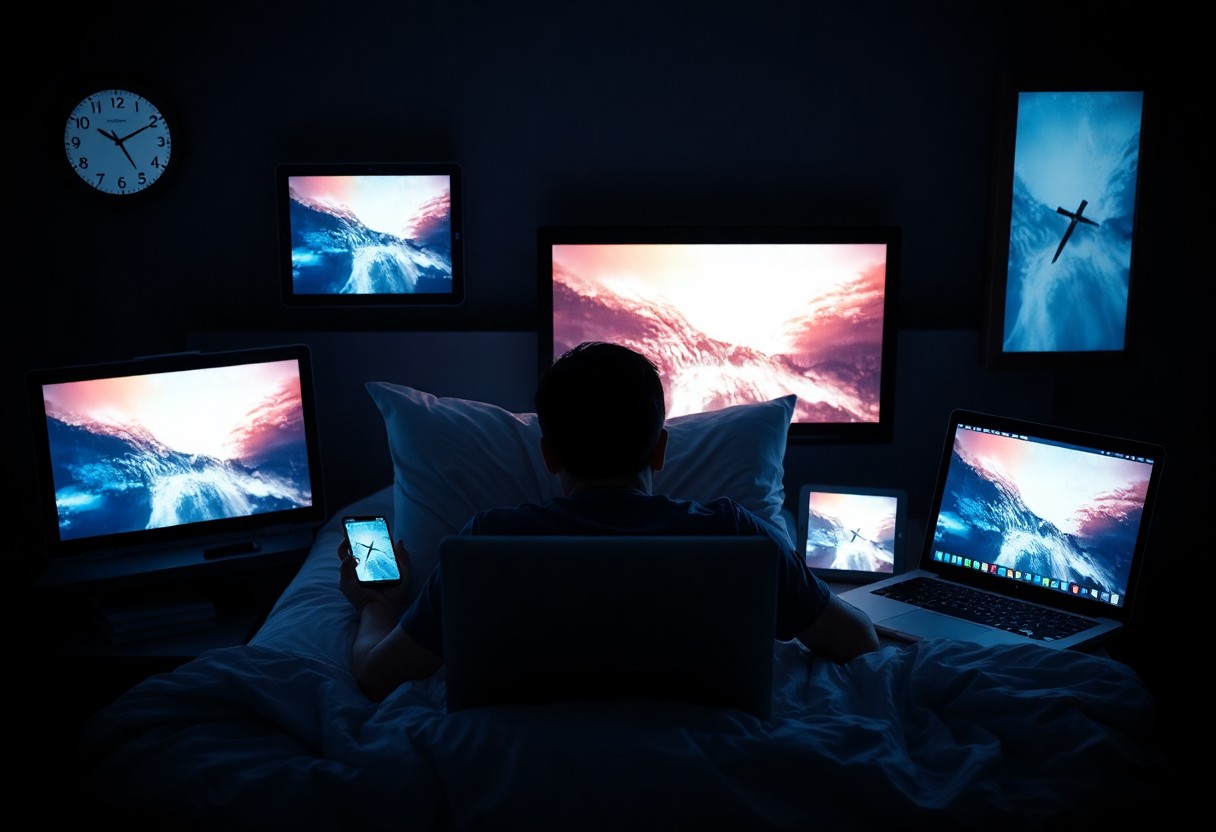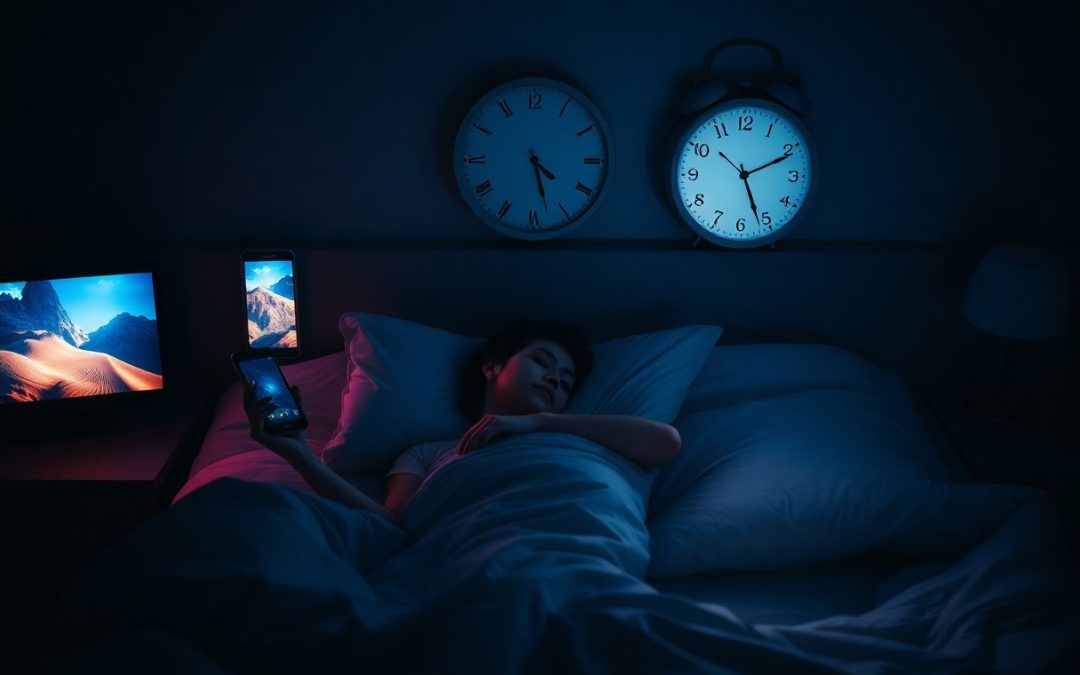Just when you think a few moments of screen time before sleep might not hurt, studies reveal it could significantly affect your health. Using screens in bed increases your insomnia risk by nearly 60% and can reduce your sleep duration by about 30 minutes. This troubling link emphasizes the importance of being mindful of your screen habits at night. By understanding how your evening activities impact your rest, you can make informed choices that enhance your sleep quality and overall health.
Key Findings
The study indicates that an hour of screen time in bed significantly heightens your risk of insomnia by nearly 60 percent and reduces your sleep duration by about 30 minutes. This alarming data comes from analysis involving over 45,000 young adults and showcases the negative impact of screen usage on sleep quality.
Impact of Screen Time on Sleep Quality
On average, as your screen time increases in bed, you’re likely to experience poorer sleep quality. Engaging in screen activities, regardless of the type, can activate your mind, making it harder to fall asleep and ultimately disrupting your rest patterns.
Insomnia Risk Correlation
Correlation between screen time and insomnia risk reveals a direct link between the two. As your screen usage increases, the likelihood of experiencing insomnia escalates, impacting not only your sleep duration but also your daytime alertness.
Another notable finding is that each additional hour of screen time in bed is associated with a 59 percent increased risk of insomnia and a loss of 24 minutes of total sleep on average. These results highlight the significant impact that late-night screen activity can have on your overall sleep quality. Prioritize reducing your screen time to enhance your rest and well-being.

Study Overview
Assuming you are concerned about your sleep quality, a recent study found that increased screen time in bed significantly raises the risk of insomnia. Specifically, an hour of screen usage before bed is linked to a nearly 60% increase in insomnia risk and a reduction of average sleep by about 24 minutes. This highlights the overarching impact that screen time can have on your overall sleep health.
Participant Demographics
Around 45,000 young adults, ranging from ages 18 to 28, participated in this extensive survey. This demographic focus allows researchers to analyze sleep patterns and screen habits within a specific group, providing insightful data on sleep health issues prevalent among young adults.
Methodology
One key aspect of the study was its methodology, which involved analyzing survey responses about screen use. Participants were asked about their bedtime screen activities, sleep patterns, and their experiences with insomnia.
Demographics were carefully considered, as the survey relied on preexisting self-reported data from a narrow population of young adult Norwegians. Participants indicated their screen time in bed and common activities, such as watching shows or using social media. The study defined insomnia based on criteria that included having trouble sleeping three times a week for at least three months, providing a detailed view of how screen use affects your sleep health.
Effects of Screen Use
It’s crucial to understand how screen use in bed can affect your sleep quality. Studies indicate that increased screen time correlates with a significant rise in insomnia risk and decreased sleep duration. With nearly a 60% increase in insomnia risk associated with just one hour of screen time, it becomes clear that your late-night activities on your device may be undermining your efforts to get restorative sleep.
Screen Time and Sleep Duration
Around 24 fewer minutes of sleep are linked to an hour of screen time in bed. This reduction can accumulate over time, leading to chronic sleep deprivation, which can have long-term effects on your overall health.
Psychological Impact of Screen Content
The impact of screen content on sleep is substantial. Engaging with interactive or alarming material can elevate your stress and anxiety levels, which may delay sleep onset and disrupt your sleep cycle. Dr. Vishesh Kapur emphasizes that stimulating or distressing content keeps your mind active, making it more challenging to unwind. In fact, content that you find particularly interesting or anxiety-inducing has been shown to prolong the time it takes to fall asleep, further adversely affecting your sleep quality.
Content choices before bedtime matter significantly. Engaging with disturbing or highly stimulating material can result in increased anxiety and prolonged sleep onset, while watching soothing or neutral content may provide a more restful transition into sleep. Understanding that your screen habits can lead to an elevated risk of insomnia and impact your daytime alertness can motivate you to make conscious decisions about what you consume before sleep. Diminishing screen time and opting for calming alternatives can enhance your sleep quality and overall health.

Recommendations for Better Sleep
Once again, prioritizing your sleep is crucial for overall well-being. To combat the rising risk of insomnia associated with screen time in bed, consider implementing strategies that promote healthier sleep habits. By minimizing your use of screens before bedtime, you can improve your sleep duration and quality, ultimately reducing your insomnia risk by nearly 60 percent, as shown in recent research.
Reducing Screen Exposure
About reducing screen exposure during the evening, it’s vital to establish a consistent bedtime routine that limits your screen time. Aim to put away devices at least an hour before sleep, allowing your mind to unwind and prepare for rest. This simple action can contribute to significantly better sleep outcomes and enhance your overall health.
Mindful Usage Habits
The key to improving your sleep lies in adopting mindful usage habits when it comes to screens. Rather than mindlessly scrolling through social media or streaming shows at bedtime, take the time to reflect on your evening activities. Aim to engage in activities that promote relaxation, such as reading a book or practicing mindfulness techniques.
Indeed, developing mindful usage habits extends beyond merely reducing screen time. Focus on being aware of your content consumption—choose calming, less stimulating material that won’t hinder your ability to fall asleep easily. Consider tracking your screen time, as research shows a one-hour increase in screen usage correlates with a 59 percent greater risk of insomnia. By prioritizing intentional and relaxing activities, you bolster your evening routine and ultimately enhance your health and well-being.
Expert Insights
Now, health professionals emphasize the importance of managing your screen time before bed. With a study revealing that an hour of in-bed screen use can increase insomnia risk by nearly 60 percent, it becomes vital to be mindful of your nighttime routines. Experts advocate for limiting screen exposure to enhance sleep quality, suggesting you set boundaries that prioritize your rest.
Commentary from Sleep Specialists
On reviewing recent findings, sleep specialists highlight that the type of screen activity may be less significant than the overall screen time. They suggest that the stimulating nature of screens can activate your mind, leading to delayed sleep onset. Therefore, it’s advisable to create a more conducive environment for sleep by reducing screen use.
Importance of Healthy Sleep Hygiene
Sleep hygiene refers to the practices and habits that contribute to quality sleep. By establishing a consistent sleep schedule and minimizing screen time before bed, you can enhance your overall sleep experience. Studies indicate that reducing your screen time in bed not only helps you fall asleep faster but can also improve your overall health. Prioritizing good sleep hygiene is important for maintaining a healthy balance, allowing you to wake up feeling rejuvenated and ready for the day.
Related Sleep Disorders
Not all sleep disturbances are the same, but excessive screen time in bed can exacerbate issues like insomnia, sleep apnea, and restless leg syndrome, which can lead to increased daytime sleepiness and affect your overall well-being.
Common Sleep Disorders
An estimated 30% of adults experience insomnia at some point, which involves difficulty falling or staying asleep. Other common disorders include sleep apnea, characterized by interrupted breathing during sleep, and restless leg syndrome, which causes uncomfortable sensations in the legs.
Health Issues Linked to Poor Sleep
Behind your sleep difficulties, a range of serious health issues may be lurking. Lack of quality sleep is linked to conditions such as obesity, diabetes, and cardiovascular disease, significantly heightening your risk for chronic ailments and impacting your life expectancy.
Disorders related to poor sleep can lead to a cascade of negative effects on your health. For instance, insufficient sleep disrupts hormone regulation, which can contribute to weight gain. Additionally, chronic sleep deprivation is associated with an increased risk of developing heart disease and even affects your mental well-being, potentially leading to anxiety and depression. Prioritizing good sleep hygiene can help mitigate these risks and enhance your overall quality of life.
Summing up
As a reminder, increasing your screen time in bed significantly elevates your risk of insomnia and reduces your sleep duration. This research indicates that even small adjustments to your screen habits can enhance your sleep quality. You should be mindful of how you use your devices at night and consider creating a bedtime routine that promotes better sleep and overall health. Prioritizing your sleep can have lasting benefits for your well-being.
FAQ
Q: How does using screens in bed affect sleep quality?
A: Research indicates that increased screen time while in bed significantly impacts sleep quality. Specifically, an hour of in-bed screen time can raise the risk of insomnia by nearly 60 percent and reduce sleep duration by approximately 24 minutes. The interactive nature of screens may activate the mind and lead to difficulties falling asleep, regardless of the type of content being consumed.
Q: Are all types of screen activities equally harmful for sleep?
A: Surprisingly, the findings from a recent study suggest that it’s not the type of screen activity that matters most but the overall screen time in bed. Whether participants were watching shows, using social media, or gaming, the total time spent on screens was directly linked to poorer sleep outcomes. Thus, it is imperative to manage overall screen usage at night to improve sleep quality.
Q: What strategies can help reduce screen time before bed?
A: To combat the negative effects of screen time on sleep, individuals can adopt several strategies. These include setting a specific time to stop using screens before bed, engaging in calming activities like reading a book or practicing relaxation techniques, and creating a technology-free sleep environment. Even small reductions in screen time can lead to improvements in overall sleep quality and duration.


